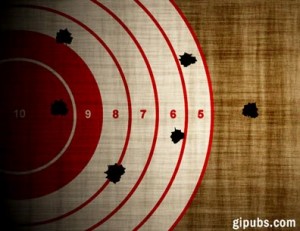Corrective training is a fantastic, yet underutilized, tool for growing your subordinates. Simply put, it is a method to correct a performance deficiency.
There are several FMs and Regs that can help you find information regarding corrective training including AR 600-20 and AR 27-10.
What is corrective training?

When your soldiers start missing the mark, corrective training is an excellent way of putting substandard performers back on target.
Extra training, extra military instruction, and spot corrections are all considered corrective training. Corrective training is considered a non-punitive measure. It is not to be confused with extra duty which is a punitive measure (non-judicial punishment under the UCMJ).
Who can conduct corrective training?
Any leader in the chain of command can utilize corrective training. This authority is an inherent power of command. It is used when a Soldier fails to perform to standard or when performance needs to be improved.
Tips to implement corrective training
Doctrine tells us
- must not be used as a punishment or appear to be punishment
- must relate directly to the observed deficiency
- must specifically address the observed deficiency
- must be discontinued once the deficiency is corrected
- must not be used in place of UCMJ punishment
Experience shows
- the leader must provide proper resources to complete the training
- must be conducted in a safe environment
- must not be ridiculous in nature
What do do when corrective training fails
If corrective training alone is not sufficient to resolve the problem and eliminate the deficiency, I suggest you consider revocation of privileges. Associate a privilege with the deficiency. Does the Soldier have difficulty showing up to formation in the proper uniform? Recommend that the commander revokes the Soldier’s civilian clothing privileges. Extreme techniques like these can hit the Soldier close to home and make a strong impact if done with tact and in a responsible manner.
Read The Mentor: Everything you need to know about leadership and counseling for more information about Counseling, Leadership, Corrective Training, and Separations in the Army.














Comments
SGT Sturtz
A Soldier of mine Lied to my Squad leader that I was not pushing out our schedules to make up an excuse for him showing up late for weapons draw (we are MPs). Suggestions for corrective action?
Mark Gerecht
Consider:
1. a 500 word essay
2. have them give a class on the subject
Dustin White
My NCO is having me do 2,566 burpees for leaving my hydro flask outside would that fall under the lines of ridiculous and abusing power.
Mark Gerecht
Without knowing the complete story and based on what little information you provided it does appear on its face to be unreasonable. I suggest you read AR 600-20 as it applies to Bullying and Hazing.
Hope this Helps in some small way.
TOP
Facebook/Twitter/Newsletter
Please like us
If you think this site is useful , follow us, and sign up for our newsletter
Facebook: https://www.facebook.com/MentorMilitary/
Twitter: https://twitter.com/AskTOP
Newsletter: http://eepurl.com/bjcYH
Feedback
Hope this helps! Did you find this information useful? We Appreciate your feedback!
Please Read! Help Us Help Others please tell your peers, subordinates, and superiors about ASKTOP.net.
Share Your Classes and Other Presentations: We are always looking for examples, classes, briefings, SOPs, templates and other information we can share for free in the ASKTOP.net Armsroom. Please help us help others by sending your ARMS ROOM stuff to: mark.gerecht@mentorinc.us
Note: This response is based on the information you provide. My comments do not represent the US Army or US government positions. Furthermore, my comments should be used for information purposes only.
Troy
If a soldier have a counseling and the assessment isnt filled out which means it’s an incomplete counseling can that counseling be used for punitive action even though it incomplete?
Mark Gerecht
If you are speaking of an Article 15 as punitive as than “Yes” they can proceed with the action without an assessment. The decision to proceed will be up to the JAG. There is typically no counseling requirement concerning Article 15 matters.
aya brea
I’m a Pv2 and I’m doing some paperworks in the office, my NCO wrote down a counselling for my buddy and ask me to file it, I just noticed the part “Session Closing” (where in the NCO should ask the subordinate if he agrees/disagree) the “I agree” box was already ticked without being read the counselling form to my buddy. It has been 2 weeks now and still my NCO haven’t read the counselling form to my buddy since my NCO took leave after the incident. My question is, should I file the Counselling form?
Mark Gerecht
The Soldier is the person that marks the block. No one else. It is inappropriate for a leader to mark the box. I am sure the leader would not want someone making that decision for them on a counseling statement.
spc hill
Does the corrective action have to have a time limit on when it ends
Mark Gerecht
Typically a time limit is not placed on corrective training. It should be stopped once the leader believes substandard behavior is corrected. In the original post it states Doctrine Tells us: must be discontinued once the deficiency is corrected
Hope this helps
TOP
Pfc P.
Can my team leader, and squad leader make me do push ups every time I see them regardless of location? I f___ked up but it wasn’t anything huge I just could not complete a task on a certain day and ever since then they have been making me do push ups every time I see them.
Mark Gerecht
PFC P.
Physical training can be used to correct substandard performance but not in the manner you are describing. The actions you are describing if factual would be more in line with abuse of subordinates and/or hazing. Both of which are serious in nature. You might find the following post useful:
What can I do if my leader used corrective training in an abusive or punishing manner?
Do I have to give a Soldier a reason before making them do corrective training?
Can a Soldier decline to do push ups for corrective training?
I believe the above post provide significant information for you to address the issue in a professional and factual manner if you believe you are being mistreated. Usually when you approach a leader in a professional manner with the facts the issue will go away. In some cases this is not what happens. In these cases you need to decide if it is appropriate to take the matter up the chain of command.
Before taking any action I would encourage you to think through the issue and determine if this is a battle worth fighting. If it is then proceed by being factual, calm, unemotional, and professional. You might even consider putting your comments and thoughts down on a piece of paper or even preparing a formal written complaint to give to the offending leaders. If you find that after you have taken the matter up the chain of command to at least the Company/Battery/Troop Commander without a professional response you have several options which include: Filing an Article 138 complaint against your commander. For more information on an Article 138 see the following post: What is an ARTICLE 138? other options include taking your complaint to the BN CDR/BN CSM, IG and/or JAG.
Again before you proceed think through the unintended consequences of your actions.
Hope this helps! Did you find this information useful? We appreciate your feedback!
TOP
Please Read!
Help us Help Others
If you think this site is useful please tell your peers, subordinates, and superiors. Also we are always looking for examples, classes, briefings, SOPs, templates and other information we can share for free in the ASKTOP.net Armsroom. Please help us help others by sending your ARMS ROOM stuff to: mark.gerecht@mentorenterprisesinc.com
SFC S
An important thing to remember is that there are still two reasons Soldiers do the wrong thing. Either they don’t know it’s wrong or they don’t care. The former is easy to fix. More times than not, unfortunately, it is the later. Why don’t they care?
Are they lashing out? (why?)
Are they trying to gain attention from you? (are you giving them enough?)
Are they trying to gain approval from thier peers? (why would thier peers approve?)
Do they think the rule is dumb? (do they understand the intent?)
Asking yourself and maybe even them why they are doing something wrong is important when assigning corrective training. If done correctly, you treat the problem not the symptom.
Mark Gerecht
SFC S. Your point is well taken and spot on.
yanni
I have been pretty nice to soldiers but I notice they don’t respect me. I also consider the fact that the soldiers are people and I feel that everyone deserves respect. But I have been brought up in a totally different atmosphere my sergeants and ssg were all dicks and I think they made me better and definitely tougher . I just want to do a good job and I don’t want to get in trouble for being to much of a dick
Mark Gerecht
While I can understand your desire not to be a so called “Dick” you must also understand that regardless of what you do someone will always complain and disagree with your decisions. While individuals may not respect you personally they must respect your rank and position.
The best advice I can provide is to treat others like you want to be treated, be fair, and honest with your Soldiers. If you follow this thought process you never have to worry about getting in trouble because you are doing the right thing.
When you do what is right and treat people fairly you will eventually gain their respect. Sometimes this is a long process for new leaders especially if they have just been promoted and stay in the same unit.
Remember they are not your friends they are your Soldiers. Keep a degree of separation between and your Soldiers being too close with them breeds familiarity and lack of respect.